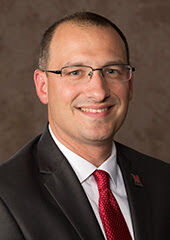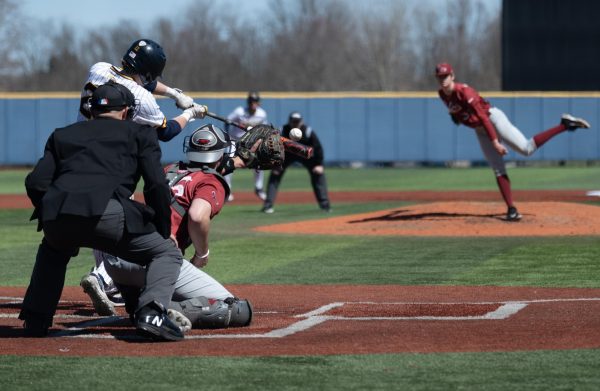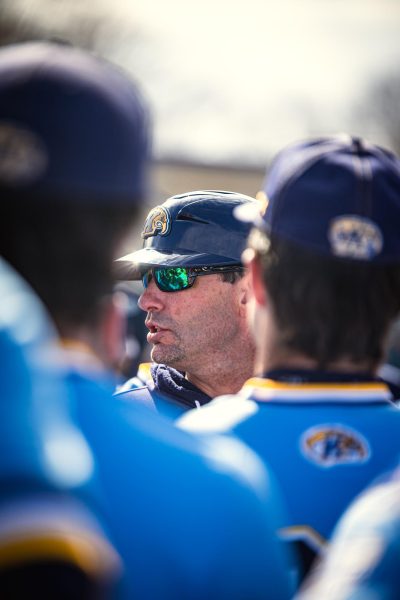Jude Killy presents his case to be Kent State’s next director of athletics

Jude Killy is currently serving as the deputy director of athletics at the University of Miami (OH). He was one of three finalists selected for the role of director of athletics for Kent State. April 5, 2021.
April 5, 2021
In the second of three presentations from the finalists for the Director of Athletics position at Kent State, the KSU community heard from Jude Killy, a man with a long history at Mid-American Conference schools.
Killy is the current deputy director of athletics and chief of staff at Miami University, where he has been on the administrative staff since 2011 and with the department of athletics since 2015. Prior to his time at Miami, Killy worked at the University of Pittsburgh as director of athletic development and director of annual fund for Pitt’s Panther Club.
He graduated from John Carroll University in 1995 with a Bachelor of Arts in communications and from Ohio University with a master of sports administration in 1998.
“The piece that I really love about Kent State that seems to be woven into everything you do is the student-first concept and the transformation of lives,” Killy said.
Killy’s presentation on what he would bring to Kent State was divided into four sections: student-athlete well-being, diversity and inclusivity, athlete interests and funding.
In regards to student-athlete well-being, Killy talked about expanding the availability of both mental and physical healthcare for student-athletes. He also said he would look at the possibility of providing long-term insurance to student-athletes beyond that which they already received for catastrophic injuries. Killy’s view of student-athlete well-being was broad and looked beyond just their time at KSU.
“Our objective as administrators and educators really ought to be to make sure our student athletes are work ready or career ready. Have we adequately prepared them for that?” Killy said. “How are we supporting their professional development, not just while they’re in school for four years, but for the forty years beyond that?”
Killy spoke about how he would seek to build the inclusivity and diversity of his athletic department and of Kent State athletics generally. He said the effort to build diversity needed to be concerted and all-encompassing.
“The key here is the more people we can include in the conversation about diversity, equality and inclusion, the more perspectives we can obtain, the better off we are all going to be because the more we listen, the more we understand,” Killy said. “That all-encompassing inclusion is a great opportunity.”
Having an open conversation was also an important topic to Killy in his section on student-athlete interests. He said it was crucial to have an open and candid dialogue with student-athletes to determine what is best for them and what they need.
Killy talked at length about the issues of revenue sharing (student-athletes profiting directly from ticket sales and advertising) and students profiting off of their name, image and likeness. He expressed concerns about Kent’s ability to afford revenue sharing, but said that the current rules on student-athletes profiting from their play are overly constrictive.
“I think that this actually provides a great opportunity for students, and I am glad that it is going to be resolved in some capacity,” Killy said. “Students should be able to fundraise money for a charity that’s important to them personally, or to showcase their skills locally or nationally. The challenge [in athletes profiting from their likeness] is going to come from an administrative perspective.”
After his presentation, Killy took questions from the audience about a wide assortment of topics, repeatedly referencing his time at Miami to talk about his history with community outreach and fundraising.
Killy talked about organizing “RedHawk Community Days” before the COVID-19 pandemic shut them down last year.
“There are seven parks in Oxford and essentially each year we have identified a park [where we] had a day of service along with the community, along with the local school districts and our student-athletes,” he said. “We’ve gone out and done cleanup and restoration of those parks, whether it is painting or installing benches.”
To display his fundraising acumen, Killy recalled a time when he was able to rapidly raise funds for the Miami baseball team. He worked with an individual donor to “rally the troop” by making calls and reaching out and they were able to raise over a million dollars in only two weeks.
If he is hired as Kent State’s next director of athletics, Killy outlined what he would do first to begin building the department he wants to see.
“We have to jump in pretty quickly on strategic planning,” he said. “But I don’t think I can do that in the absence of perspective and opinion from the president and the president’s cabinet and certainly from coaches, senior staff and student-athletes.”
The first prospective director of athletics presentation came from Margaret McKinley on Thursday, April 1 and the final one will be tomorrow, April 6 at 11:15 a.m. with Randale Richmond, current senior associate athletic director at Old Dominion University.
Owen MacMillan is sports editor. Contact him at [email protected].























